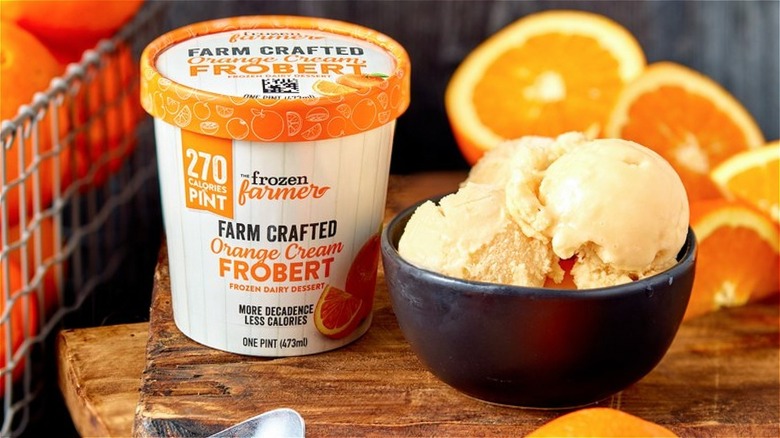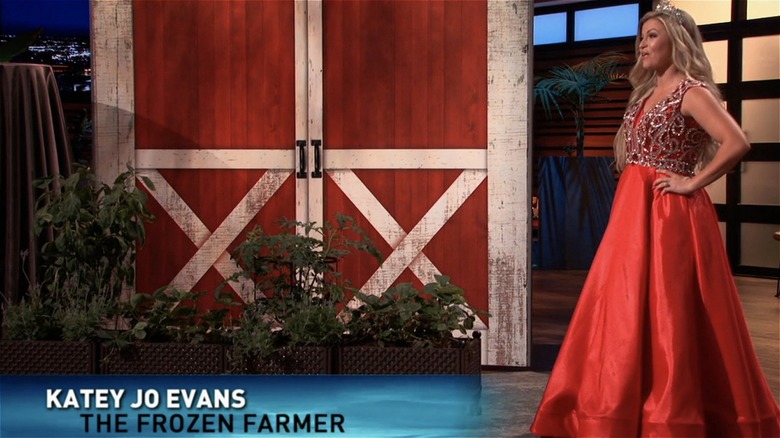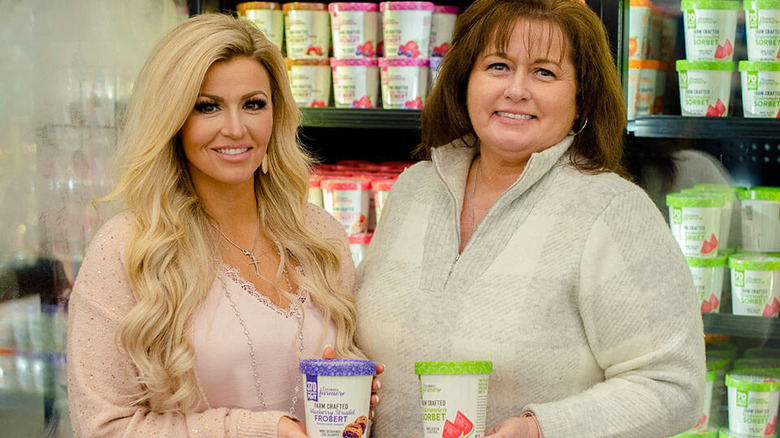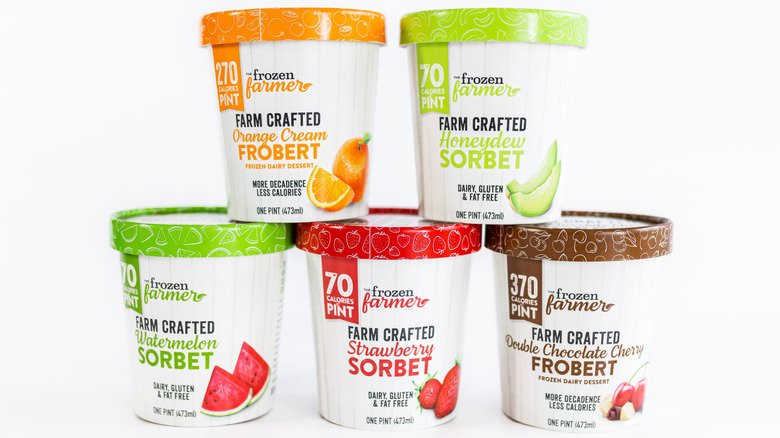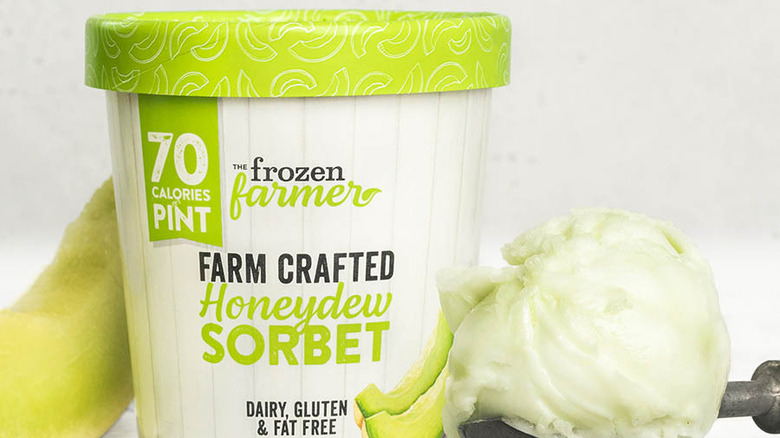What Happened To Frozen Farmer After Shark Tank?
Whereas some people saw bruised and unwanted fruit, farmer and chef Katey Evans saw a golden opportunity that took her all the way to "Shark Tank." Produce farming is a notoriously difficult profession. It offers razor-thin profit margins that depend on a myriad of fickle, erratic factors such as weather, the market economy, and dwindling access to natural resources like water. Even when everything goes right, some of the produce that has made it through an entire growing season isn't attractive enough for people to reach for it by the time it makes it to the grocery store or farmer's market.
To help repurpose produce that would otherwise be thrown away and turn it into profit, Evans created The Frozen Farmer, along with her husband and mother. Evans is part of a third-generation family farm. With the help of her family members and fellow farmers, she chose to turn bruised, misshapen, and discolored fruits into premium frozen sorbets and ice creams instead of discarding them.
When the enthusiastic Evans made her pitch on "Shark Tank," nobody denied that the product was delicious and the brand story compelling. However, Evans had to plead her case that this was the one ice cream brand to invest in.
What happened to The Frozen Farmer on 'Shark Tank'?
In season 11, episode 17, which aired in 2020, Katey Evans began her pitch with her beauty-queen-to-farm-girl transformation, demonstrating that not everything is as it seems. She displayed an unappealing-looking strawberry, explaining it still had plenty of nutrition and flavor. According to Evans, one in five pieces of produce never makes it off the field, leading to astronomical levels of food waste each year.
She hoped to change that with her blend of sorbets and nice creams (a blend of ice cream and fresh fruit), indicating this was how her family farm had decided to turn "imperfect produce into profit." The line included orange creamsicle nice cream, as well as honeydew and watermelon sorbets, which the sharks agreed were delicious.
But if farming seems to be a difficult line of work, combining it with mass ice cream manufacturing was its own additional challenge, and the sharks agreed. Evans asked for an investment of $125,000 in order to assist with packaging and manufacturing for a 20% stake in the company. One by one, the crew of possible investors shot down Evans, citing that this sort of farm-to-table product was most likely only feasible on the local scale. That is until Lori Greiner finally agreed to buy in for $125,000 in exchange for a 30% stake. Evans happily accepted the terms.
The Frozen Farmer after 'Shark Tank'
When the episode was filmed in September 2019, Katey Evans said that The Frozen Farmer had earned about $300,000 in profit at that point in the year, with only about 15% accounted for from grocery store sales. Its primary retailer had been Giant Food, but only a few stores carried the product. Lori Greiner's money came with the attached agreement that the company would need to land a major chain distributor.
With Greiner's investment, Evans was able to ensure that The Frozen Farmer would be available at over 150 Giant Food locations. After launching a direct-to-consumer online shopping segment of the business, Walmart, Kroger, and Stop & Shop gave The Frozen Farmer frozen shelf space, making the product available nationwide.
In the initial episode of "Shark Tank," Greiner said the brand was in need of a new logo and branding call. While The Frozen Farmer held off on rebranding for some time, it finally changed its brand imagery. Instead of a farmstand-style logo, it now has a bolder, simpler script and sits on a shiplap background that features a large image of the produce included in the frozen treat. The company also changed the term "nice cream" to Frobert, which includes apple pie and double chocolate cherry flavors in addition to the original orange cream offering.
Is The Frozen Farmer still in business?
As of the airing of Season 12, in which we got an updated segment on the company, The Frozen Farmer reported about $1 million in annual sales and $15 million in committed future orders. Lori Greiner predicted over $20 million in sales for 2022, and she was correct in believing the company would only continue to grow. In 2022, The Frozen Farmer was available in around 8,000 stores nationwide and had a developing direct-to-consumer business.
To sustain its rapid growth, The Frozen Farmer secured a line of financing to the order of $2.5 million from WSFS Bank, with Katey Evans saying, "We went from a small family business that hand-packed ice cream to a national distribution model really overnight," adding, "if you don't have product, you don't have sales, so it was critical that we secure funding to focus on our inventory build and stay ahead of production."
All of this growth can partially be attributed to Evans' show-stopping performance on "Shark Tank," where she managed to charm and tug at heartstrings. But the product also seems to sincerely be top-notch. The Frozen Farmer features low-calorie flavors with no added sugars as well as more traditional offerings. All of the labels proudly present the number of calories in the entire pint — not per serving — giving customers peace of mind to finish the whole container.
What's next for The Frozen Farmer?
After years of unprecedented growth and securing new buyers and investments in 2022 and 2023, The Frozen Farmer seems to still be on a meteoric rise. In the statement announcing WSFS's backing of the brand, the bank said that you can expect to see The Frozen Farmer on more freezer shelves across the United States, as well as an ever-expanding lineup of flavor offerings.
In 2023, the company collaborated with Delaware-raised country music star Jimmie Allen to release a new flavor called Miss Angie's Peach Cobbler Frobert. The recipe is based on Allen's mother's peach cobbler recipe and combines peaches, ice cream, and spiced crumble. The flavor was only released to 2,000 Kroger locations, but with this new offering and WSFS's predictions for the company, it seems that limited edition flavors will likely become a bigger part of the brand's identity.
Even with the seemingly endless opportunities for growth, it seems Katey Evans is determined to keep The Frozen Farmer as a personal project. In an interview with Delaware Business Times in 2020, Evans said of the family-run farm and brand's success, "At the end of the day, you're still family, and we all have the same goal: to create a legacy for the next generation and for the farm and Frozen Farmer to succeed."
